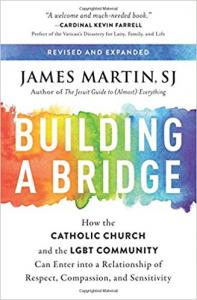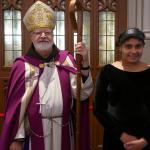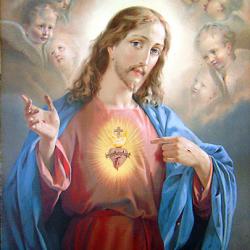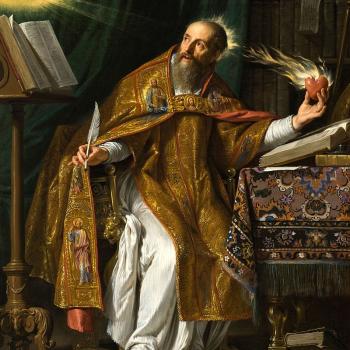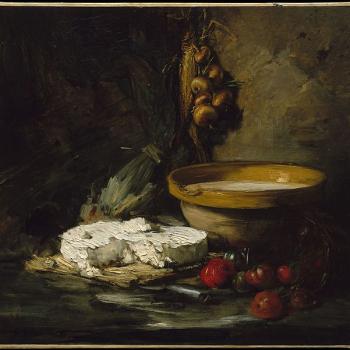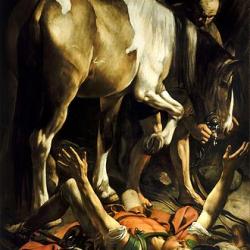A Prayer of Welcome
Loving God,
Open our hearts to those most in need:
The unemployed parent worried about feeding his or her children.
The woman who is underpaid, harassed or abused.
The Black man and woman who fear for their lives.
The immigrant at the border, longing for safety.
The homeless person looking for a meal.
The LGBT teen who is bullied.
The unborn child in the womb.
The inmate on death row.
Help us to be a nation where every life is sacred, all people are loved, and all are welcome.
Amen.
Read more at America Magazine.
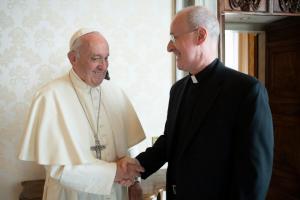
One of the most controversial, critiqued and beloved figures in the Catholic Church today in 2021 is Fr. James Martin. Fr. Martin’s name brings immediate anger and virol. I had to delete this post when I posted it in one of my FB posts because it brought nothing but hate comments. Most people seem to only skim the surface of an article (myself included) and never really dive into what someone actually wrote.
Do you know why Fr. Martin believes what he believes? Do you know him for only that one thing? Do you know what else he actually teaches? It is more than that one thing that bothers you, I can assure you. Did you know that Fr. Martin is pro-life? Someone in one of their comments seemed surprised at this. Understanding someone is a key to loving them more and actually praying for the better. You can still dislike him, but dislike him with full knowledge and not only partial knowledge. He brings some spiritually edifying material to the body of Christ. Find out what it is by actually reading on. First off to know is that the Rev. James Martin, S.J., is a Jesuit priest, author and editor at large at America magazine. I actually met him once while working at CatholicTV. He came in to do some spots for us.
People seem to love or hate him based on his teaching about LGBTQ +issues. Why does he teach so strongly about it?
Over the years, I’ve discovered a great divide. I lament that there isn’t greater understanding and more conversation between LGBT Catholics and the institutional church. I would rather not refer to two “sides,” since everyone is part of the church. But many LGBT Catholics have told me that they have felt hurt by the institutional church—unwelcomed, excluded, and insulted. At the same time, many in the institutional church want to reach out to this community but often seem confused about how to do so. Yes, it seems that there are some who don’t seem to want to reach out and some who even seem hostile to LGBT people, but the bishops I know are sincere in their desire for pastoral outreach.
For the past three decades as a Jesuit, part of my ministry has been, informally, trying to build bridges between these groups. But after the shooting in Orlando, my desire to do so in a more formal way intensified. So when New Ways Ministry, a group that ministers to and advocates for LGBT Catholics, asked a few weeks after the Orlando tragedy if I would accept their Bridge Building Award and give a talk at the award ceremony, I agreed. The name of the award inspired me to sketch out an idea for a “two-way bridge” that might help bring together the institutional church and the LGBT community. -Fr. James Martin, Building a Bridge (2018)
The Orlando Tragedy happen in the summer of 2016. A crazed gunman stormed into a popular gay nightclub in Orlando, Florida, and killed forty-nine people. At that time this happen it was the largest mass shooting in U.S. history.
Even if you disagree with some of his conclusions, Fr. Martin’s goal is to evangelize the LGBTQ+ community. Here is a fair critique of his teachings by Trent Horn, least someone say I am giving him a free pass. As Trent says in the video Fr. Martin has not officially dissented from Catholic teaching and he definitely is not a heretic. It doesn’t mean their is no concern with what he teaches. Fr. Martin is not problem or content free. Trent is a lot kinder and just in his critique then so many others who heap scorn upon the man. And even some who have blasted him harshly can come to the realization that there is a better way.
Fr. Martin, I know you are aware of my work, as for years I’ve called out the pattern of ambiguity, confusion, and error that I believe you deliberately embrace relative to the Church’s teaching on homosexuality. I’ll never waver in challenging that pattern, now or in future. But I ask your forgiveness for those times I’ve written about your work in ways that you found personally wounding and for any lack of charity or respect I’ve shown you in past. Perhaps you and I could one day “reason together” about such things, as brothers in Christ. I’d gladly do so cordially and charitably in private. I pledge that in future I’ll assiduously avoid similar pitfalls.
Let us all work together to “write the good fight” with both truth and charity, and in a way that lets us finish the race knowing we’ve led others to the same glorious finish that is our deepest aspiration.
Deacon Jim Russell Writing the Good Fight (February 17, 2020 ) Crisis
But my goal in this post is not to criticize this one issue and rip it apart, nor to heap praise upon it and tell you how awesome he is for it. I’m asking the question what else is Fr. Martin known for? What else does he bring to the table of Catholic thought? The answer is plenty. Fr. Martin is not just about his LGTBQ+ stuff even if that is the main thing he is known for. There are plenty of other things in his resume of Catholic teachings. People who dislike Fr. Martin will probably think I need to heap more fire from heaven upon him. People who like him probably think I shouldn’t say anything negative at all. But I’m laying out the good and the bad the best that I can. So here we go.
As I said before Fr. Martin is pro-life.
But acknowledging that women’s bodies are their own does not diminish my own reverence for the living body in a woman’s womb. Thus, I cannot deny that I see the child in the womb, from the moment of his or her conception, as a creation of God, deserving of our respect, protection and love. Mysterious, precious, unique, infinite, made in the image and likeness of God. Holy. Father James Martin: Why I Am Pro-Life | America Magazine
Fr. Martin had a different career path in mind then being a priest.
IT’S STILL DIFFICULT for me to believe that I found myself working in a Kingston ghetto after a six-year career in corporate finance. Perhaps even more surprising, I was working at the hospice as a novice of the Society of Jesus, the Roman Catholic religious order also known as the Jesuits. As part of a ten-year preparation period for ordination to the priesthood, I spent a good deal of time working among the poor. And, at a point in life when I expected to have a high-paying job, a career, a house, a family, and a car (or two), I had, instead, none of those things.
– Fr. James Martin S.J., In Good Company: The Fast Track from the Corporate World to Poverty, Chastity, and Obedience (2010)
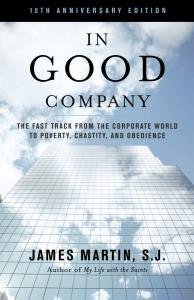
Fr. Martin has greatly inspired by Thomas Merton.
For me to be a saint means to be myself,” wrote the Trappist monk Thomas Merton in his book New Seeds of Contemplation. “Therefore the problem of sanctity and salvation is in fact the problem of finding out who I am and discovering my true self.” There are few lines in contemporary spirituality more powerful than those. One could spend a lifetime pondering and putting into effect that insight. Of course the same idea has been said elsewhere, many times and in many ways, from philosophers to saints to ecumenical councils. But somehow Merton’s descriptions of what it means to be your “true self’ and the temptations of trying to be the “false self’ have been the most meaningful to me. Perhaps that’s because Merton himself has been so meaningful in my life.
-Fr. James Martin S.J., Becoming Who You Are: Insights on the True Self from Thomas Merton and Other Saints (2013)(Christian Classics) Paulist Press
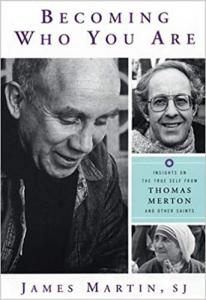
Fr. Martin really cares about the Saints.
I went from someone embarrassed by my affection for the saints to someone who counted it as one of the joys of my life. Even after the novitiate, as my Jesuit training continued, I read about the saints and took special pleasure in meeting new ones. You can never have too many friends. Now I find myself introducing others to favorite saints and, likewise, being introduced. It’s funny—the way you discover a new saint is often similar to the way in which you meet a new friend. Maybe you hear an admiring comment about someone and think, I’d like to get to know that person, such as when I started reading about English Catholic history and knew that I wanted to meet Thomas More. Perhaps you’re introduced to a person by someone else who knows you’ll enjoy that person’s company, just as that novice introduced me to Thérèse. Or perhaps you run across someone, totally by accident, during your day-to-day life. It wasn’t until my philosophy studies as a Jesuit that I read St. Augustine’s Confessions and fell in love with his writings and his way of speaking of God.
-Fr. James Martin S.J. My Life with the Saints (10th Anniversary Edition) (2016) Loyola Press
Fr. Martin talks about his ignorance of Catholic Culture.
During my second year as a Jesuit novice, I wandered into the community television room one Friday evening to see what video was being served up. Television watching was a popular pastime for novices living on a thirty-five-dollar monthly stipend in our novitiate, located in a poor neighborhood in Boston, Massachusetts. In typical Jesuit style, our TV room consisted of fifteen individual recliners lined up in front of a large television, an admittedly strange setup that once prompted my brother-in-law in-law to ask if, besides vows of poverty, chastity, and obedience, we took a vow against sofas, too.
“What’s on?” I asked the other novices as I walked into the TV room.
“The Song of Bernadette,” said one, glancing up from the TV.
“What’s it about?” I asked. Everyone looked up from his recliner, apparently aghast.
“You’re kidding, right?” said another novice.
“Please tell me you’re kidding.”
I shook my head dumbly. One thing I realized soon after joining the Jesuits was how little Catholic culture I had grown up with, or at least absorbed. Though both my parents were good Catholics, our family lived in a predominantly Jewish neighborhood where bar mitzvahs were more common than first Holy Communion parties. My sister and I attended public schools, and the two of us darkened the doors of the parish church only on Sundays and holy days of obligation. -Fr. James Martin S.J, .Lourdes Diary: Seven Days at the Grotto of Massabieille (2006)
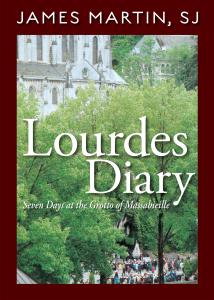
That time Fr. Martin worked with a theater company.
The Society of Jesus was not created simply to run schools. Its original goal, as articulated by its founder, the Basque lover-turned-soldier-turned-mystic-turned-writer, soldier-turned-mystic-turned-writer, Saint Ignatius of Loyola, was much broader than that. The fundamental goal of the Jesuits is to “help souls.” Simply put, this means that for more than 450 years Jesuit priests and brothers have taken jobs that were both expected (running parishes, retreat houses, and high schools) and unexpected (exploring ing uncharted rivers, overseeing observatories, and cataloging newly discovered indigenous languages.) Among its members have been theologians logians and philosophers, to be sure, but also physicians, poets, politicians, cians, and peace activists. (You can read a fuller history of the Jesuits in the back of this book, in the chapter “Who Are the Jesuits, Anyway?”) So working with a theater company is a fairly tame venture for a Jesuit, and very much in keeping with the mission to help souls, even if they happen to be actors, directors, and playwrights.–Fr. James Martin S.J, A Jesuit Off-Broadway (2007)
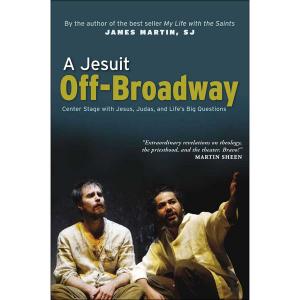
Fr. Martin is a big believer in Jesuit spirituality.
So if anyone asks you to define Ignatian spirituality in a few words, you could say that it is:
1. Finding God in all things
2. Becoming a contemplative in action
3. Looking at the world in an incarnational way
4. Seeking freedom and detachment
You could say any of those things, or all of them, and you would be correct. To understand the Ignatian vision, it helps to know about the man himself. Like all of the spiritual masters, Ignatius’s experiences influenced his worldview and his spiritual practices. Plus, the story of St. Ignatius Loyola is a good reminder that everyone’s life—whether sixteenth-century mystic or modern-day seeker—is primarily a journey of the spirit.
-Fr. James Martin S.J The Jesuit Guide to (Almost) Everything (2010)
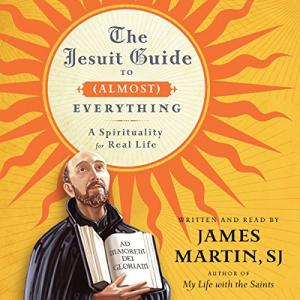
Fr. Martin is a big believer in the concept of Joy, Laughter, and Humor.
Joy, humor, and laughter are underappreciated values in the spiritual life and are desperately needed not only in our own personal spiritual lives, but in the life of organized religion. Joy, to begin with, is what we’ll experience when we are welcomed into heaven. We may even laugh for joy when we meet God. Joy, a characteristic of those close to God, is a sign of not only a confidence in God, but also, as we will see in the Jewish and Christian Scriptures, gratitude for God’s blessings. As the Jesuit priest Pierre Teilhard de Chardin said, “Joy is the most infallible sign of the presence of God.” Joy, humor, and laughter are spiritual gifts that we ignore at our peri
-Fr. James Martin S.J, Between Heaven and Mirth (2011)

In his book on Jesus Fr. Martin describes his personal travels in the Holy Land, expounds on Bible passages associated with the sites that he visited during his travels, and relates the passages to current life.
Who is he? Why another book on this first-century Jewish man? Why have I spent years studying the life of an itinerant preacher from a backwater town? Why did I spend two weeks traipsing around Israel under the broiling sun to see places where a former carpenter lived and sites that he may (or may not) have visited? Moreover, why have I committed my life to Jesus? The answers turn on the question of who I believe Jesus is, so it’s fair to tell you before we begin our pilgrimage. My starting point is a classic theological statement: Jesus Christ is fully human and fully divine. This is one of the first things that Christians learn about their faith. But what does it mean? To begin with, Jesus of Nazareth, the person who walked the landscape of first-century Palestine, wasn’t God pretending to be human.2 He was a flesh-and-blood, real-life, honest-to-God man who experienced everything that human beings do. Jesus was born and lived and died, like any human being. -Fr. James Martin S.J, Jesus: A Pilgrimage (2014)
Fr. Martin has actually written a novel.
Mark turned on the radio and fiddled with the dials, unsuccessfully trying to find a song he liked. He turned off at the exit onto a smaller road. After a year, he knew the route cold. Forty-five minutes door-to-door wasn’t so bad; and even if traffic delayed him, the monks didn’t care if he was a little late, unless he was scheduled to meet with a contractor. For men whose lives revolved around the clock, they were surprisingly tolerant of his tardiness. Mark had said as much to the abbot, meaning it as a compliment. “Our lives revolve around God, not the clock,” the abbot said.
He liked Father Paul. As head of the abbey, he could have insisted on being called Abbot Paul, but on the first day he told Mark, “I’ve been Father Paul for so long that it fits.”
Abbot came from a word meaning “Father,” Mark had discovered in his online research after his first day of work, during which he’d been introduced to a raft of unfamiliar words. When he asked Dave, a college friend who recommended him for the job, if the monks spoke Latin, Dave howled. “Oh yeah!” said Dave. “That’s how I communicate with them when I’m doing their books—in Latin. We all speak Latin to one another. Of course they don’t speak Latin, you nimrod.”
But on that first day they might as well have been. The English words the monks used were ones Mark remembered only dimly from his architectural studies. “Refectory,” “cloister,” “chapter house” he heard on the first day, as Father Paul showed him around the abbey. Mark never did, and never would, get the hang of the names of the times that the monks prayed in chapel, which occurred every few hours. With the exception of “Vigils,” which made some sense, the terms identifying the other times of prayer—“Lauds,” “Compline,” “Sext,” and “None”—seemed like nonsense words. He had been corrected enough times on the pronunciation of “Compline” (“Com-plin, not com-pline,” said one older monk sourly) that he now simply said, “Your prayers.” Why couldn’t they just say “morning prayer” or “evening prayer”? Or maybe they intentionally made their way of life inscrutable to outsiders.
– Fr. James Martin S.J, The Abbey (2015)
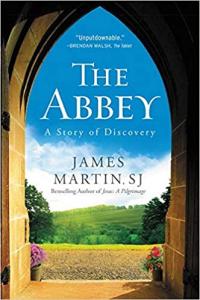
Father Martin’s latest book is about Learning to Pray
Whenever we pray, we are united with believers across the world who are lifting their hearts and minds to God. We are also united with those who have gone before us, who continue their prayers before God. This is one part of what Catholics mean by the “communion of saints.” Not long ago a friend told me that when she prays the Rosary, the series of prayers counted out on beads, she remembers all the people she knows, living and dead. In this way, she says, even when alone, she is praying the Rosary with other people. That kind of prayer also expands us. If we are more aware of others when we pray, we are enlarged. In their book Christian Spirituality, theologians Lawrence S. Cunningham and Keith J. Egan speak of the Christian life as “an attempt to enlarge our circle of human concern in a way that helps us to enter God’s circle as well.”7 Prayer can encourage us to move beyond our own narrow concerns. – Fr. James Martin S.J, Learning to Pray (2021)
Fr. Martin likes to talk about Jesus
James Martin, SJ@JamesMartinSJ: Gospel: When Jesus sees people who are hungry, thirsty or struggling, the Gospels tell us that his first reaction is ἐσπλαγχνίσθη (esplanchnisthē). The usual English translation is “his heart was moved with pity,” but the original Greek is stronger: he felt it in his bowels….. the seat of emotions in the Hellenistic world. That is, Jesus felt it in his guts. We are meant, as Jesus’s disciples, to have that same reaction when we see people who are poor, sick, struggling, rejected or marginalized. Not judging (Why don’t they work harder?)… Or fatalism (Well, I guess that’s the way of the world). Or resignation (There’s not much I can do about that). Or even despair (It’s hopeless. Nothing will ever change). But compassion. Compassion that moves us, as it did for Jesus, to action.
Whether or not you like Fr. Martin’s teachings on LGBTQ + or on some other issues it is very plain and evident to see that he has so much more to offer than just one topic and has written and made several books, videos and articles spanning the breadth and depth of Catholic faith.


